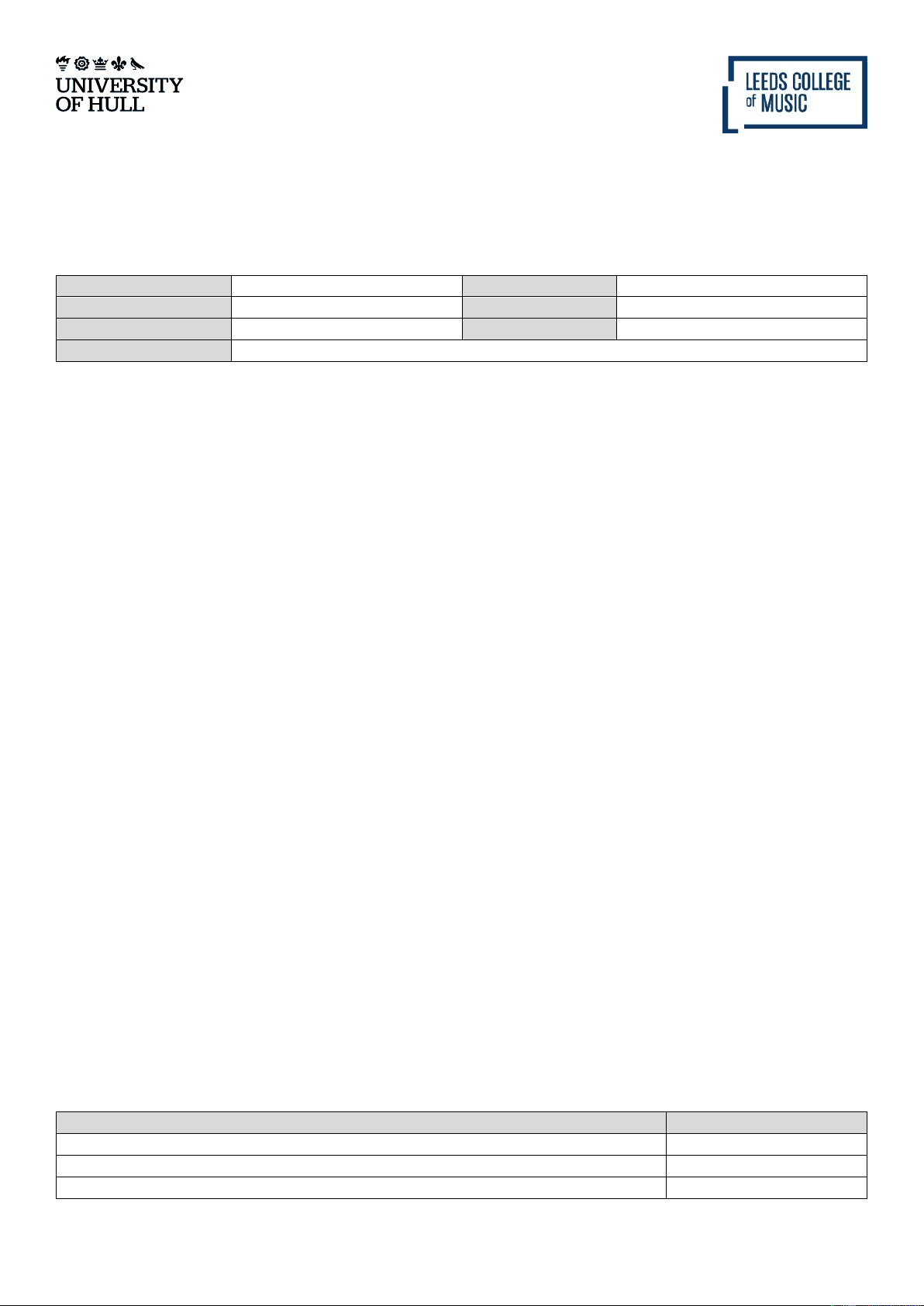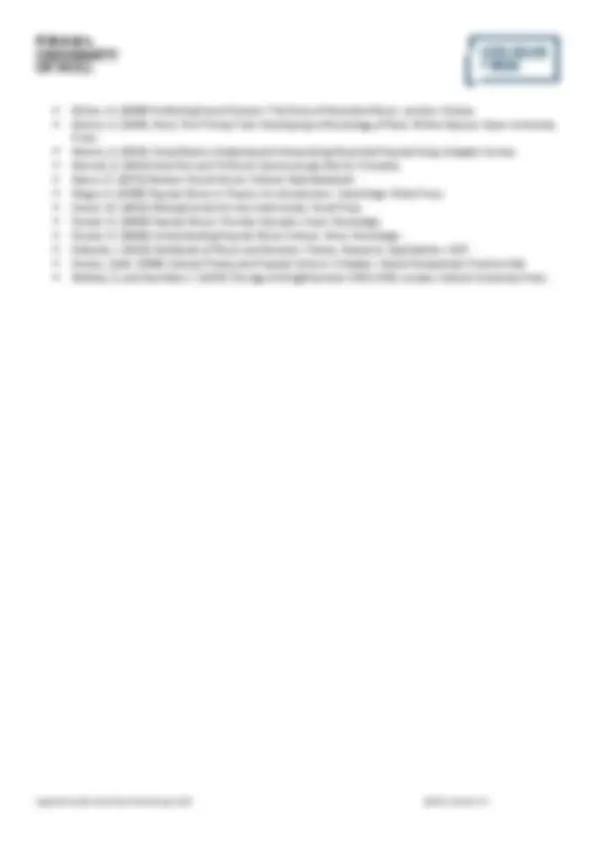



Study with the several resources on Docsity

Earn points by helping other students or get them with a premium plan


Prepare for your exams
Study with the several resources on Docsity

Earn points to download
Earn points by helping other students or get them with a premium plan
Community
Ask the community for help and clear up your study doubts
Discover the best universities in your country according to Docsity users
Free resources
Download our free guides on studying techniques, anxiety management strategies, and thesis advice from Docsity tutors
The module specification for contextual studies 1 (popular) at the university of hull. The compulsory, 30-credit module is delivered via lectures, workshops, and seminars and aims to equip students with compositional, musicological, and aural skills. Students will investigate the social, commercial, and contextual issues surrounding popular music and are expected to compose as part of the module. Learning outcomes, assessment methods, and a recommended reading list.
Typology: Lecture notes
1 / 3

This page cannot be seen from the preview
Don't miss anything!


Module Title: Contextual Studies 1 (Popular) Module code: HBAMPM004 NQF level: Level 4 Credit value: 30 credits Semester of study: 1 and 2 Module type: Compulsory Pre-requisites: None Available to: BA (Hons) Music (Popular) Module overview This team-taught module equips students with compositional, musicological and aural skills through the examination of repertoire, styles, literature, concepts and discourse to better understand the effect of these on society. It is delivered via lectures, workshops and seminars. Students will investigate the parameters through which we consume and construct music, how we communicate their use, the social, commercial and contextual issues surrounding them, and the manner in which we can employ these parameters to popular music practice. The module seeks to challenge the students’ understanding of how music is constructed, used and interpreted within popular culture. Students will also be expected to compose as part of the module and consider their creative choices in a wider contextual frame. Aims This module forms part of the contextual studies strand of the programme and addresses core musical and academic skills that support the students’ specialist study with particular reference to their pathway. The module aims to:
Opportunities for formative feedback Formative oral feedback will be given in tutorials and workshops. Assessment Method Description of assessment Length/Duration Weighting Module LOs addressed Spoken analysis (recording) 10 minutes 20% 2, 4 Essay 2000 words 30% 2, 4 Music and reflective commentary 7 minutes of music and 1000 words
Re-Assessment Method Description of assessment Length/Duration Weighting Module LOs addressed* Spoken analysis (recording) 10 minutes 20% 2, 4 Essay 2000 words 30% 2, 4 Music and reflective commentary 7 minutes of music and 1000 words
*Where practicable, assessments may be delivered through the conservatoire’s VLE or by video to ensure that overseas students are not disadvantaged or incur unnecessary travel costs. Assessments delivered through the VLE will be timed and invigilated. Indicative Reading List ( please note this includes resources for all BA Music pathways ) Essential: Brackett, D. (2000) Interpreting Popular Music. Cambridge: Cambridge University Press. Horner, B and Thomas Swiss (eds). (2008) Key Terms In Music and Popular Culture. Malden: Blackwell. Piston, W. (1987) Harmony. New York: W.W. Norton. Shuker, Roy. (2008) Understanding Popular Music Culture. Oxon: Routledge. Storey, John. (2018) Cultural Theory and Popular Culture: An Introduction (8th^ Edition. Oxon: Routledge. W.W.Norton. (1996) The Romantic Generation. London: Harper Collins. Whittall, A. (1995) Music Since the First World War. London: Oxford University Press. Recommended: Bukofzer, M. (1977) Music in the Baroque Era. London: J.M.Dent and Sons. Burgess, R. (2014) The History of Music Production. OUP. Clarke, E. Nicholas Cook, Daniel Leech-Wilkinson and John Rink (eds) (2009) The Cambridge Companion to Recorded Music. New York: Cambridge University Press. Frith, S. (2001) Will Straw and John Street (eds). The Cambridge Companion to Pop and Rock. Cambridge: Cambridge University Press. Frith, S. and Simon Zagorski-Thomas (eds) (2012) The Art of Record Production. Surrey: Ashgate. Golding, C, Hepworth-Sawyer. (2010) What is Music Production? Focal Press. Graham, G, (2005): Philosophy of The Arts: An Introduction to Aesthetics. Oxon: Routledge. Gilreath, P. (2010) Guide to Midi Orchestration. Focal Press. Griffiths, P. (1984) Bartok. London: J.M.Dent and Sons. Gronow, P, and Ilpo Saunio. (1999) An International History of the Recording Industry. London: Cassell. Jourdain, R. (2002) Music the brain and ecstasy. Avon Books. Katz, M. (2004) Capturing Sound. London: University of California Press. Kennedy, M. (1999) Strauss. Cambridge: Cambridge University Press. Kirby, F.E. (1979) Music in the Classic Period. New York: Schirmer Books. Lederman, M (ed) (1975) Stravinsky in the Theatre. New York: Da Capo Press. Longhurst, B. (2007) Popular Music and Society. Cambridge: Polity Press. Mellers, M. (1964) Music in a New Found Land. London: Barrie and Rockliff.